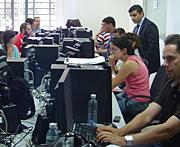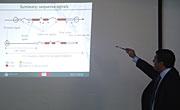Bioinformatics workshop offers interdisciplinary crash course
Kick-starting an LAU initiative to integrate the interdisciplinary field of bioinformatics — the application of information technology to the study of molecular biology — into the university’s curriculum, graduate students, faculty and staff enjoyed a workshop on bioinformatics held at the Byblos campus from June 30–July 2.
Organized by the Computer Science and Natural Sciences departments in Byblos, the workshop, which combined lectures and hands-on practice, was entitled “Bioinformatics Workshop: Genomics, Proteomics and Statistics.”
It featured guest speaker Georges Khazen, who is currently doing his Ph.D. in computational neuroscience at the École Polytechnique Fédérale de Lausanne, in Switzerland.
Participants were introduced to various topics, such as the kinds of programs and databases available online that facilitate information-sharing and research for scientists around the world by allowing them to deposit their findings and access existing research.
“The main purpose of this workshop was to introduce students to these [online] tools, [and to explain] how to use each tool and when,” says Khazen.
Bioinformatics combines biology and computer science, and is “currently one of the hottest areas in science,” according to Khazen. The field initially developed because of a need to save data obtained by biologists, but now is increasingly important because it’s also used to analyze that data, he adds.
The two departments hope to introduce bioinformatics into their curriculum beginning with courses next fall, says Dr. Haidar Harmanani, chair of the Computer Science Department on the Byblos campus. He says they are planning to develop a program — the first of its kind in Lebanon — based on feedback.
Harmanani worked with Maya Farah, senior technician in the Molecular Biology Lab at Byblos, and Dr. Costantine Daher, chair of the Natural Sciences Department in Byblos, to organize the workshop.
Farah describes the specialized workshop as “a three-day crash course [that] gives the students an idea of what’s going on in this field.”
According to Daher, the workshop “complements” the courses the School of Arts and Sciences currently offers, as computer science graduate students already benefit from a course on bioinformatics.
However, constructively, the planned new program would integrate both departments, says Harmanani.